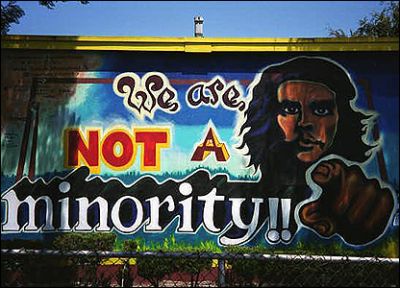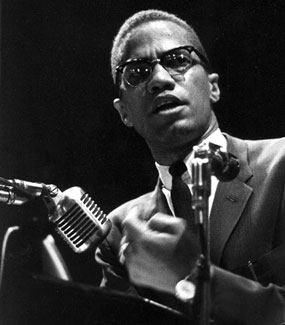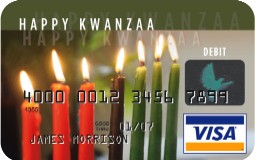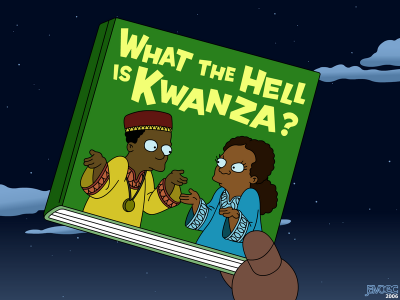The term revolutionary is often batted about and is bestowed upon most anyone who finds their ideas falling to the left of the political mainstream. For that reason we have more coffee shop revolutionaries than I can shake a vegan biscotti at! Now I don’t mean that as pot-shot against coffee shop poets (okay, well maybe I did a mean it a little) but really its about the question, “What does it take to be revolutionary?” I was left deeply reflecting on that after watching Che. I’ve been anticipating the film for over a year now and I was lucky enough to see it in its intended four hour format. For all you who are wondering, “Should I really go see a four hour movie?” The answer from me is emphatically, “Yes!” I’ll openly admit that I’m biased, but that is because I am constantly wondering about what it has taken and will take to transform the world.
Here is Skillz’s 2008 rap up … why are there so many versions of this on Youtube? And why did he hit it on the head with Nas, R. Kelly and the Inauguration?
If you’re not careful, the newspapers will have you hating the people who are being oppressed, and loving the people who are doing the oppressing. ~Malcolm X
“Support Black Business” this was my approach to the principle of Ujamaa for years, but I realized that supporting a business by someone who looks like me will likely get our people no closer to liberation. Okay, so maybe everyone isn’t going for liberation, but hear me out. The issue with simply thinking of Ujamaa as supporting Black business is that it 1) assumes Black people who own businesses are going to take their profits and reinvest in our community and 2) that capitalism is the only system for us to participate in. The first one is faulty for obvious reasons, if you need an example please see BET. The second point is one that folks tend to think I’m crazy for suggesting. We can have a system of trade that does not put financial capital at the center, but instead re-establishes the importance of exchange of goods that aren’t simply monetary and builds community.
What would our communities look like if we concentrated on contributing positively to each other lives, rather than concentrating on accruing financial capital? CONTINUE READING
When it comes to discussing collective work and responsibility, I usually end up on the other side of most conversations which seem to start with, “The reason Black folks can’t get ahead is…” or “We’re just like crabs in a barrel…” While these conversations have their place, I think we have been conditioned to overlook the collective work that we take part in daily. While there are many issues that face our community, many of use continue to struggle and fight but don’t receive the acknowledgment that is deserved.
In my Black Studies class I often ask if Black folks are working to change their situation. I usually get an overwhelming chorus of “no’s” and “Not the people I know.” This is usually followed up by a discussion of how many folks from their neighborhoods “aren’t trying to do anything with their lives” and “stay on the block all day.”* After I let students air out these concerns, which have some legitimacy, I begin to ask them if they’ve volunteered, helped out another local community member, or participated in any actions that have helped uplift Black people. Within a few moments most of them identify that they have. CONTINUE READING
Last year on Dumi Says, I began a series called “Black History- Contemporary” in which I would highlight the words of elders and ancestors in our past that rang true when they were said and hold even more relevance today. In reality, Black History becomes distilled away as factoids and thus its relevance decreases for everyday people.
Yesterday and today, some of the most violent attacks on the Palestinian people in decades were launched by the Israeli military. As I write this, the death toll is approximately 280, and the number of innocent lives that will continue to be lost are unknown. I value human life and really have dreamed about a peaceful middle east, but now, more than ever, I’m concerned that my wishes may be nothing more than a dream. The question of Zionism remains one of the most politically contentious among global citizens today, but for me it’s not a question of politics, it’s a question of human life and rights. Beneath you will find two videos from the great Kwame Ture (Stokely Carmichael), who left the earth in 1998, speaking on the distinction between Judaism and Zionism and his position on imperialism. Please listen, I’m sure you won’t agree with all, but there is much to be learned from here. I am amazed at the freedom with which Kwame Ture spoke, you’ll likely never see another Black leader be this unfettered on these matters.
Hattip to Rosa Clemente on the speeches and to Mombe Banga for cajoling me to bring BHC back
“To define ourselves, name ourselves, create for ourselves and speak for ourselves.”
Naming: What’s in a name. If you’ve been visiting my blog, you’ll see that I post under the name Dumi. Dumi is not a nickname, it’s my name. Sometimes people ask me, “What’s your real name?” To which I will respond, “Dumi Eyi di yiye.” As they look on with bewilderment I remind them that I am called by many names, but all serve the same purpose. Dumi was given to me by a council of elders in an African rites of passage and means, “I am the Northeast wind, pushing, cajoling, and inspiring greatness in myself and others.” My surname is Eyi di yiye, which means, “We set the standard this time.” I often go by Dumi, because it calls unto me to live up to the meaning of my name as well as affirms to me that I am on the path to doing the work that is necessary for myself and my people.
Creating: I’m old school in my belief that we, people of African descent, are some of the greatest creators on the planet both historically and contemporarily. And I don’t just mean, we created the Nile civilization, so we’re great, I’m talking about things as recent as Afrofuturism, we are truly amazing. But beyond the artistic, I often wonder what will we need to create to transform our reality? I stress our creation, because the revolution will not organically occur, all revolutions and revolution inspired changes come from hard work which, for our people, usually come from mental and spiritual work. This is difficult to conceive when the worlds’ financial markets are in crisis, the world is war-torn, and people’s spiritual work consists more of proselytizing than loving reflection. This year I will be pushing to create things, both material and immaterial, for the transformation of my community in the area of education.
Speaking: In the past year, I’ve been blessed to get into multiple spaces: universities, tv, radio, etc. to share my perspective. From a number of folks I’ve been asked, “aren’t you scared what you say, will get you in trouble?” Well, no. In reality, what I say 9 times out of 10 is what most of my people are thinking and feeling, so I feel comforted knowing that I can contribute to the process of adding to the stew of Black voices in the public sphere. Does that mean I’ll be perfect in my commentary, scholarship, or blog rantings? Absolutely not, it is my goal to stimulate thought and thoughtfully respond to critique. All our our voices and thoughts contribute to fabric of the social world, so I look forward to my words and perspectives to be sharpened by my allies and enemies in the struggle.
Those are just some thoughts I’ve been having on self-determination. I know it could mean so many things to different people, what are you thinking?
Umoja- Unity
One of my boy’s who said the other day, “Having a Black family without drama is like having China without rice.” First off, it made be laugh, but it made realize how every year I get a rash of calls from friends and mentees who loath the trip home for the holidays because the last thing practiced is unity. See, as adults, returning home means we see how we have grown and tragically sometimes how that growth becomes increasing incompatible with the folks we grew up loving and continue to love. This is not to suggest that our families are unchanging, but being away, regardless of age, often means returning homes presents new challenges to family unity.
Unity can be thought of in grand terms, but of late I’ve been thinking about what it takes to keep a family together. The reality is that as times become more challenging, financially in particular, the fabric of families are challenged. How can I, as a returning family member, respect the differences of those at home and the new ways that I’ve adapted to living under? How can I honor the traditions and norms that have been established in home that sometimes challenge me?(And no, it ain’t about completely compromising your practices. I certainly don’t have to eat pork, but it certainly don’t have to turn my nose up at my great aunt who has been using hogma’s for decades.) For me, the greatest solution to dilemmas of unity in the family are humility and forgiveness.
Humility, loosely, being about recognizing when you are out of line or when others are out of line but making sure to offer them correction without attitude or with ill intention. Too often, the issues that we face when we get home get compounded when someone “checks” someone else and people’s positions and statuses get challenged. For me, when I’m home, I will always be a child, but an adult child who loves his family enough to offer correction in a loving way. Secondly, forgiveness can help you find some form of healthy balance when, inevitably, offense occurs.
These are a couple of ways that I’ve been trying to build unity in my family, but making sure there is mutual honor and respect. What about you?
“Pro-Black like Craig Hodges but my dashiki’s in the cleaners.” – Common
Being Pan-African is a weird thing. To many folks it means wearing dashikis, avoiding swine, and shouting ase at every opportunity. I, however, realize that you aren’t going to do that. For most Black folks, the holiday of Kwanzaa is one tied to Pan-Africanism and thus gets mentioned more in their living rooms on TV commercials than at family gatherings. I’ve decided we’ve been frontin’ on Kwanzaa for no real good reason. So here are some pre-emptive responses to questions and concerns.
Yo, did you know Kwanzaa isn’t even real?
Okay, unicorns, not real.
Leprechauns, not real.
Kwanzaa = real. CONTINUE READING
I don’t think I was really prepared for those four words, but as the clock struck midnight and November 5th rolled in I started hearing and reading the words “I am an American,” from many of my friends and family. Well, much like my man Ice Cube said, “I’m here to deprogram you, don’t forget what they made your great grandmama do, your great granddaddy do without a dollar or a penny or a thank you…”. I am very thankful for an electoral victory, but an election can’t erase the reality that we came from or live in.
The question of Americaness is one that I’ve been in several debates about recently and I was surprised by people’s conceptions of their identity. CONTINUE READING








